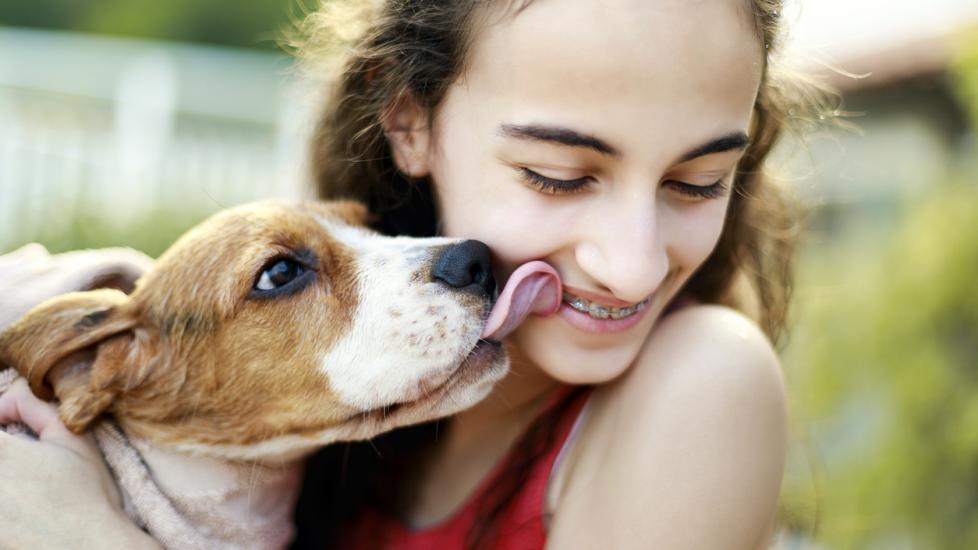Can You Be Allergic to Dog Saliva?
Allergies occur when your immune system overreacts to seemingly harmless substances in the environment. People can be allergic to a wide range of things, but some of the more common allergens come from dogs and cats, including their dander.
But is saliva on that list? If your skin ever started itching or you developed a rash after getting licked by a dog, you might wonder if you could be allergic to dog saliva.
Can People Be Allergic to Dog Saliva?
The simple answer is yes, you can be allergic to a dog’s saliva.
In the United States, it is estimated that up to 30% of the population is allergic to dogs and cats.
Many people believe that if you are allergic to pets, it’s the fur that’s the problem. But contrary to popular belief, dog hair is not the culprit. Instead, your body’s allergic responses are directed toward proteins found in a dog’s dander (skin flakes), urine, blood, and saliva.
Dog saliva has multiple protein profiles that may trigger your immune system. In fact, a dog’s saliva has more protein types than their skin, so it can potentially cause more allergies than dander.
If you’re allergic to the proteins in a dog’s saliva and the dog licks you, your immune system will activate and attack the proteins in the saliva just as if they were a virus or bacteria on the skin. This can result in a rash or hives, and your skin can become itchy, red, and/or swollen.
In addition, if your pet licks their fur or your furniture, carpet, clothes, and other items, it leaves salivary proteins that can dry and be dispersed through the air. If you’re allergic to dog saliva and inhale airborne proteins, it can cause watery eyes, sneezing, and/or coughing. In severe cases, this can lead to an asthmatic attack.
That means you do not have to be directly exposed to dog saliva to have an allergic reaction. Interestingly, 90% of households in the United States have detectable levels of dog/cat allergens, which means salivary proteins are carried around by people and on inanimate objects. As a result, people who do not have pets can still be at risk for a reaction through inadvertent exposure.
Can You Be Allergic to Just Certain Dogs' Saliva?
Yes. Dogs can have different protein profiles, so you can be allergic to saliva from other people’s dogs even if you are not allergic to your own dog’s saliva. Also, you may have become desensitized to allergens in your dog’s saliva over time, which is why you do not react to it.
Dog breed, size, age, and gender do not play a role in determining whether a person will be allergic to the saliva or not. Even two dogs of the same breed will have different protein profiles in their saliva. A person may react to one of the dogs and not the other.
There are some breeds that produce more saliva, like the Saint Bernard, and you would think this would cause more problems for a person with allergies. However, if you do not have a sensitivity to the proteins found in the Saint Bernard’s saliva, there will not be a reaction.
How Do You Know If You're Allergic to Dog Saliva?
If you think you may have a sensitivity to dog saliva, ask your doctor. They may order a skin-prick test or intradermal skin test. With these tests, a dog salivary/dander protein extract is introduced under the surface of your skin, and the area is monitored over time for signs of redness, inflammation, and swelling.
Another type of test can be performed on your blood that measures the level of immune response to different allergens (including dog saliva).
References
Centers for Disease Control (CDC).
National Institute of Health (NIH). Pet Allergens.
Chan SK, Leung DYM. Dog and Cat Allergies: Current State of Diagnostic Approaches and Challenges. Allergy, Asthma & Immunology Research. 2018;10(2):97.
Polovic N, Wadén K, Binnmyr J, et al. Dog saliva – an important source of dog allergens. Allergy. 2013;68(5):585-592.
Featured Image: iStock.com/MaFelipe
